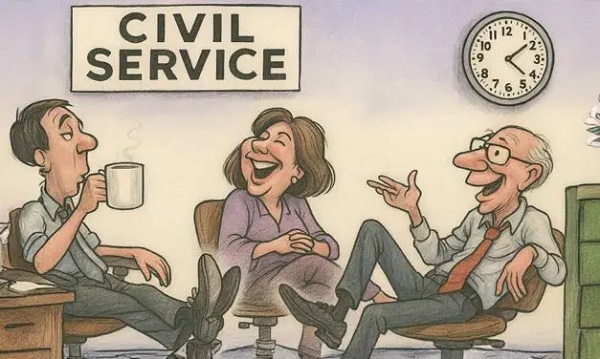Health
Horrific and Deadly Effects of Antidepressants

 The Vigilant Fox
The Vigilant Fox
Once you see what else these drugs are doing, you’ll never look at depression “treatment” the same way again.
The following information is based on a report originally published by A Midwestern Doctor. Key details have been streamlined and editorialized for clarity and impact. Read the original report here.
Did you know that SSRI antidepressants INCREASE suicidal thoughts by 255%?
A clinical trial on healthy volunteers found that 2 out of 20 became suicidal after taking Zoloft.
One was literally on her way to kill herself when a timely phone call saved her life.
But it’s not just suicidal thoughts that make antidepressants dangerous.
And once you see what else these drugs are doing, you’ll never look at depression “treatment” the same way again.
Selective serotonin reuptake inhibitors—or SSRIs—are one of the most harmful medicines prescribed today.
And that’s saying a lot because the market is FULL of harmful medicines.
What’s so bad about these antidepressants?
First of all, their use is widespread and frequently unjustifiable.
They promise to be a magical solution to depression and anxiety, but it’s quite the opposite.
In fact, they can cause side effects far worse than what they claim to treat.
SSRIs don’t just dull your emotions, and they don’t alter your brain chemistry for the better.
They literally reprogram your brain.
Between 40% and 60% of users report emotional numbness. Not just negative emotions—all emotions.
Joy, pain, motivation—all of it completely flatlined.
Some describe it as “life without color” or a “zombie-like” existence.
Sure, maybe you don’t feel depressed anymore. But you don’t feel anything at all.
That sounds… terrible.
Depression can be serious, but should we accept emotionless zombies as the alternative?
If you want to dig even deeper into the dark side of antidepressants and why they’re so harmful, check out @Midwesterndoc’s comprehensive report on the subject. And be sure to share this with anyone you know who may be considering starting an SSRI.
And it’s not just becoming an emotionless zombie you have to worry about. The emotional shutdown can lead to something that is much worse than depression and anxiety.
I don’t mean just a little anger here and there.
SSRIs are causing people to commit suicide—and yes, even horrific mass shootings.
And guess what? The FDA knew about it.
Prozac triggers hallucinations, mania, and violence, and the FDA has known all along.
Even animals become aggressive on SSRIs.
But instead of going back to the drawing board, the FDA approved it anyway.
After nine years on the market, 39,000 people reported major psychiatric events. And those are only the people who reported it…
Really makes you question FDA approval, doesn’t it?
Did you know most of the mass shooters we hear about in the news were often on SSRIs?
It’s true.
And the media even reported on it. But then, they stopped.
That’s weird.
So why are we “not allowed” to talk about SSRIs and violence anymore?
It’s pretty simple.
It would blow the lid off one of the most dangerous pharmaceutical cover-ups in modern history.
It would expose the truth that Big Pharma knowingly released drugs that could make people snap and kill other people.
And they just kept selling them anyway.

But the psychotic violence caused by SSRIs is only the tip of the iceberg.
Obviously, not everyone taking these drugs becomes a mass shooter. But that doesn’t mean the other side effects are any less terrible for those who experience them.
SSRIs truly warp your mind, body, and emotions. And sometimes it is irreversible.
The numbers are truly chilling:
→ A 255% increase in suicidal thoughts
→ 30% of SSRI users develop Bipolar disorder
→ 59% suffer long-term sexual dysfunction
With many saying their libido never came back even after stopping the drug.
The science is clear. The harm caused by SSRIs greatly outweighs any benefits they provide.
Talk about depressing…
A 2020 study involving 20 healthy volunteers with zero history of depression or other mental illnesses had shocking results.
They were each given Zoloft.
TWO of them BECAME suicidal.
One of them was even on her way to kill herself when a divinely timed phone call interrupted her plans.
These two study participants were still affected several months later. They were actually questioning the stability of their personalities.
This doesn’t sound like a magic solution. This sounds like torture.
Speaking of stopping SSRIs—good luck!
They are highly addictive.
And it’s not just physical addiction. It’s neurological.
And because of what they do to the brain, it can take years to step down the dose and wean off of them. Years!
Withdrawal symptoms include things like:
– Brain zaps
– Panic attacks
– Suicidal spirals
– Derealization
And these symptoms can last weeks, months, or even years.
It’s not uncommon to fail and continue taking them because the withdrawal is just that bad.
A 2022 review found that 56% of users who tried to stop SSRIs experience withdrawal symptoms, and 46% describe it as severe.
Psychiatrists mislabel it as a “relapse” and prescribe even more drugs.
The system is set up to trap you. There’s no exit.
And the most vulnerable groups?
Pregnant women and children.
Despite strong evidence linking SSRIs to birth defects, premature birth, and newborn death, the FDA still endorses their use during pregnancy.
One study showed a six times higher risk of pulmonary hypertension in newborns.
Another study showed that SSRI babies lost height and weight in just 19 weeks.
This isn’t good.
SSRIs are being pushed on everyone. Especially vulnerable people like foster kids, parolees, prisoners, and elderly nursing home residents.
And in many of these cases, there is no real ability for them to say no.
That’s not mental health care. That’s drugging people.
The industry tells us SSRIs are “fixing a serotonin imbalance.”
But that’s a lie.
There’s no solid evidence that depression is caused by low serotonin.
So what’s the real mechanism at play here?
SSRIs alter brain wiring. And obviously not always in good ways.
SSRI users describe feeling like their “personality changed” after starting the drug.
The reports are endless and absolutely chilling.
Some were left numb for years. Others became aggressive, impulsive, or dissociated from reality.
Many say they don’t recognize who they became after taking SSRIs.
Excuse me… what?!
And of course, patients and their families are rarely warned about these effects.
Most say they were never told about the risks. There was no informed consent.
How can you not inform depressed people that their medication might make them suicidal? How is it even possible that we can be asking that question?
They experienced these things and talked to their doctors.
They were gaslit every step of the way.
If you or someone you love is taking SSRIs or is considering taking them, I urge you to read the full report from A Midwestern Doctor
How many more people have to suffer before this ends?
How many more people who reach out to their doctor because something is off and they’re looking for help are going to be hurt, sometimes permanently?
It’s time to expose the cover-up and end Big Pharma’s abuse and gaslighting once and for all.
RFK Jr. is right—this could finally be the turning point.
For 40 years, this tragedy was hidden behind slick ads and corrupted science.
But now it’s in the light and MAHA is ready to fight.
If you know anyone considering starting an SSRI, be sure to forward them this information. Because if you wait until after, it might be too late.
Thanks for reading!
This information was based on a report originally published by A Midwestern Doctor. Key details were streamlined and editorialized for clarity and impact.
Agriculture
“We Made it”: Healthy Ostriches Still Alive in Canada

Looks like we made it. For another weekend at least. Until sanity settles down into the head into the head of the federal government that remains fixated on the killing of 399 healthy ostriches. As the clock wound down today, an announcement from the farm proclaimed, “We made it today,” calling it another “miracle Friday.”
WATCH TODAY’S Miracle Friday Announcement
Earlier in the day, Rebel News’ Drea Humphrey reported, “There’s apparently a SWAT team up the road, I hope that doesn’t mean they’ve gotten bad news,” wondering “if the police were preparing to aid the CFIA in the cull.”
Dacey Media reported that the farm said that “Ostrich Hunters” were also spotted at Universal Ostrich Farms according to Katie Pasitney The “kill pen” is fully set up and CFIA have been luring ostriches into it.
But as of 5:30 ET, it seems the farm and the ostriches may have escaped to live another day as the Supreme Court of Canada (SCC) did not hand down a decision to grant a further leave to the farm to prepare its case, or dismiss the case, allowing the Canadian Food Inspection Agency (CFIA) to proceed with their “cull” to kill 399 healthy ostriches.
The palpable, raw government over-reach that includes over 100 Royal Canadian Mounted Police (RCMP) that have occupied the farm highlights the mismanagement of the CFIA and may be one of the reasons that the SCC has hesitated in making a decision before the weekend.
Call to Dismantle the CFIA
On today’s Stand on Guard interview Katie Pastiney, spokeswoman for the Universal Ostrich Farms in British Columbia called for the dismantlement of the Canadian Food Inspection Agency. She says that the CFIA:
“Needs to be dismantled and we need to rebuild this organization back up from the ground up and we need to have a new vision.
“We need to have a new mission and a brand-new face for Canadians that will give us hope that we will be protected not attacked.”
“The Canadian Food Inspection Agency continues to overuse their authority, overuse their excessive freedom that they’ve been given, and they have zero accountability for their actions.”
The farm has been embroiled in a dispute with the federal government and its CFIA agency for close to a year. The agency claims the flock of ostriches has the avian flu, but it refuses to test the farmers’ birds, even though they have been healthy for 258 days. At the same time the CFIA will not let the farmers pay for the tests themselves, saying they will charge them $250,000 per ostrich and put them in jail for 6 months.
The federal agency and the RCMP have seized and occupied the farm since September 22, 2025. they have conducted a campaign of harassment of the farm family and their flock of ostriches that included: arresting the farmers when they were told to go feed their birds; using lights and heavy equipment at night’; sending drones to chase the birds that resulted in pushing one bird over the fence so it hurt its leg, not treating the animals properly; and not feeding the ostriches full rations of food and water and not treating the birds the CFIA injured. These activities have continued as the CFIA continues to construct a “kill box” of hay bales that have been on fire four times while under the CFIA’s supervision and occupation.
Running Out of Time
In a stunning report on X October 2nd, however, before the Supreme Court of Canada had made decision, the CFIA has daily continued to move forward to kill the ostriches ignoring the SCC legal “stay.”
Karen Esperson, Pasitney’s mother yesterday reported on X:
“We need to put CFIA in check.
“This organization feels they are greater than the Supreme Court of Canada. they are still positioning the birds and putting them in the position to be killed immediately. They are assuming they know the outcome of the Supreme Court oof Canada. Do they think they are better than the Supreme court? That they are going to for sure win?
“The Supreme Court has not decided.
“What is happening?
“We are on a stay order and yet I just got a call that they have a whole bunch of birds herded in a little circle in the kill pen.
“Waiting. This is animal cruelty.”
Efforts to Save the Ostriches
More and more Members of Parliament have been speaking up on behalf of the farmers including the local provincial representative, the local Member of Parliament Scott Anderson, who visited the farm trying to talk to the CFIA and also the Official Leader of the Opposition Pierre Poilievre spek out yesterday.
A second press conference hosted by John Catsimatidis, a New York radio host, billionaire and friend of Donald Trump and Dr. Oz, was also held yesterday. The USA Trump administration representatives including Robert F. Kennedy say they want to either pay for the ostrich testing or help re-locate them to the United States for further research opportunities. This outreach has been ignored.
CFIA Has Staff Enough to Kill but NOT Enough Staff to Test?
In my interview today with Pastiney she explained how the CFIA did originally give their ostrich farm an exemption that was later rescinded because the CFIA told them they were “understaffed and we’re not able to perform these tests.”
“There was an exemption package that was given to us on January 2nd. We have an email from Canadian Food Inspection Agency stating that we qualify for special rare genetics within our herd and that we could be exempt.
“Now when we followed through with that because we needed to test them just to show their DNA and their genetics and show their lineage that between January 2nd and January 10th something happened.
“Now we didn’t qualify we lost that right.
“And on January 10th they said sorry you don’t qualify for special rare genetics because we are understaffed and we’re not able to perform these tests.”
Why does the CFIA have staff to occupy the farm for weeks and to kill 399 ostriches as well as requisition the Royal Canadian Mounted Police (RCMP) over 40 cars and reportedly more than 100 police on the farm since September 22nd, and not have the money to test the birds for the exemption?
How much has this debacle and exercise into Carney Government overreach been charged to Canadian taxpayers?
More than the tests to see if the ostriches are healthy or if they qualify for the exemption?
Other Farmers May Join in Efforts to Disband the CFIA
Pastiney says:
“I just did an interview with a farmer that this very same thing happened to them and it was based off a suspicion of tuberculosis outbreak on their farm.
“They [the farmers] had over 600 head of cattle, they had sheep, they had goats, they had pig or pigs, they had chickens.
“They [the CFIA] came in based off suspicion and off their own negligence they killed everything this beautiful older farm had to find out in the end that they tested after everything was dead and there was no tuberculosis.”
“I asked her a very important question, and I said could you trust this organization again? And she said, absolutely not.
“So, it became very clear to me after this about talking to two or three farmers that the Canadian Food Inspection Agency needs to be dismantled.”
“It is an organization that has lost the trust of Canadians.
CONCLUSION
WATCH Katie is Fighting For Everyone’s Freedom | Stand on Guard
www.kraydensrightnews.com is a reader-supported publication.
To receive new posts and support my work, consider becoming a free or paid subscriber.
Health
Disabled man needs help as hospital continues to pressure him with assisted suicide

From LifeSiteNews
Roger Foley has been pressured to consider euthanasia while being denied adequate care, prompting a new campaign to cover his medical costs and support his fight to return home.
Roger Foley, an Ontario man, has been forced to turn to charity after being denied sufficient care from hospitals which continue to push euthanasia on him.
On September 30, the Life Care Network launched a LifeFunder to cover medical costs for Roger Foley, a disabled Canadian who is struggling to receive support in an Ontario hospital which is encouraging him to end his life with Medical Assistance in Dying (MAiD).
“Hospital staff have repeatedly offered and pressured me to consider Canada’s infamous assisted suicide program Medical Assistance in Dying (MAiD) while simultaneously obstructing the very services and supports I need to live safely,” Foley revealed in a write-up for the fundraiser.
“Despite my condition, I have fought tirelessly for my rights, dignity, and the ability to return to the community,” he continued.
Foley, who is well known for speaking out against the injustice of Canada’s euthanasia regime, suffers from spinocerebellar ataxia, an incurable brain disease that makes it difficult to move.
As a result of his, he requires caregivers to assist him in eating, drinking, and getting up. According to Foley, his caregivers mistreated him while caring for him at his home. In 2016, Foley was admitted to the London Health Sciences Centre (LHSC) in Ontario for food poisoning and has been there ever since.
Foley revealed that over the past nine years he has repeatedly been offered MAiD despite his desire to be released from the hospital and return home with the help of caregivers.
In May, Foley began enduring even more pain when the LHSC switched out the amber lights in his room for bright bulbs. Foley, who is light sensitive, is now in so much pain that he is unable to be lifted for meals.
“I can only tolerate fluids for a few minutes at a time using makeshift taped-together ski goggles. I am unable to eat solid food or take oral medications,” Foley explained.
“I live in constant pain, severe fatigue, and cognitive decline from dehydration and lack of sleep,” he continued. “Staff continue to impose arbitrary and unsafe ‘rules,’ including denying me side rails during transfers and barging in with bright lights – despite knowing it causes me extreme harm.”
Now Foley is seeking private funding for a Personal Support Worker to assist him with feeding, medication, hydration, and basic hygiene support. Life Care Network, an organization which assists vulnerable Canadians at risk for MAiD, has intervened to raise the necessary funds for Foley’s care.
In an interview with LifeSiteNews, Lino DeFacendis, founder and CEO of Life Care Network, stressed the importance of defending Foley from a medical system which appears to prioritize ending his life with MAiD over providing proper care.
“There needs to be a re-awakening that every life is precious and must be treated with true dignity and compassion no matter how difficult the circumstance,” DeFacendis said.
“Killing oneself via MAiD is never the answer to one’s problems,” he declared.
To support Foley’s medical care, please visit his LifeFunder page.
-

 Alberta2 days ago
Alberta2 days agoJason Kenney’s Separatist Panic Misses the Point
-

 Energy17 hours ago
Energy17 hours agoOttawa must eliminate harmful regulations to spur private investment in pipelines
-

 Business12 hours ago
Business12 hours agoCarney’s Bungling of the Tariff Issue Requires a Reset in Canada’s Approach to Trump
-

 Automotive2 days ago
Automotive2 days agoBig Auto Wants Your Data. Trump and Congress Aren’t Having It.
-

 espionage1 day ago
espionage1 day agoStarmer Faces Questions Over Suppressed China Spy Case, Echoing Trudeau’s Beijing Scandals
-

 Business18 hours ago
Business18 hours agoDaily Caller EXCLUSIVE: Chinese Gov’t-Tied Network Training Illegal Immigrants To Drive Big Rigs In US
-

 Business18 hours ago
Business18 hours agoLabour disputes loom large over Canadian economy
-

 Censorship Industrial Complex11 hours ago
Censorship Industrial Complex11 hours agoWinnipeg Universities Flunk The Free Speech Test


















